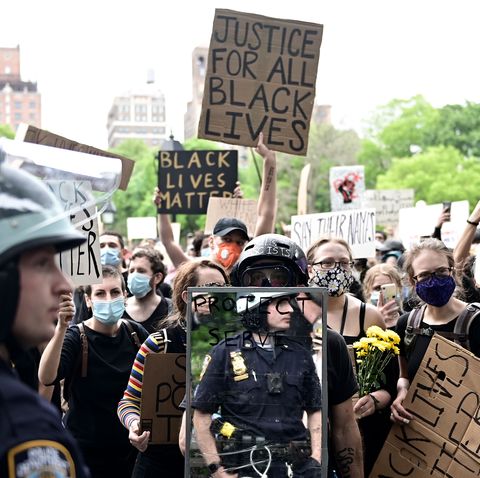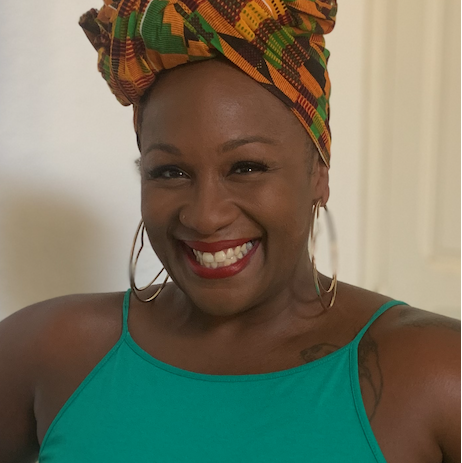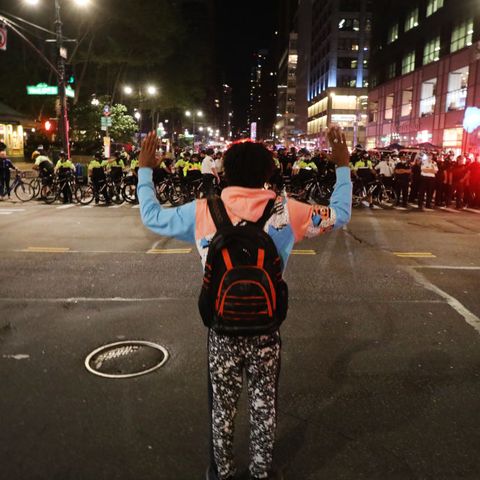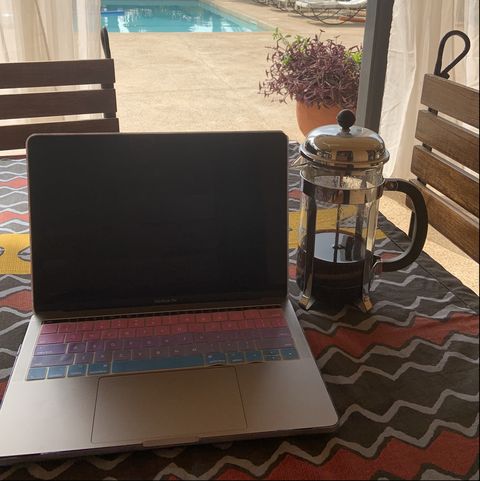
JOHANNES EISELEGetty Images
For the past few weeks, America has watched as protestors in all 50 states have poured into the streets to demand change. They’re asking for justice in the deaths of George Floyd, Ahmaud Arbery, and Breonna Taylor. They’re asking for an end to police brutality and an acknowledgement that Black lives matter. They’re asking for a much-needed revolution.
In response, they often been met with force, with police arresting more than 10,000 protestors since the demonstrations (and resulting curfews) first began. And at organizations like Good Call, a free arrest support hotline in New York City, the surge was striking.
Porsha-Shaf’on Venable, a supervising public defender who staffs the Good Call hotline, says that pre-protest, she was getting five or six calls a night. “The first night of protest, I was slaughtered,” she told ELLE.com. “I probably answered five to 10 calls an hour, and I’m low-balling the number…We’ve gone from maybe two to three lawyers during a night to 19 lawyers per shift.”
Good Call aims to provide access to justice for everyone; the hotline runs 24 hours a day and is staffed by public defenders in all five boroughs. Typically, Venable, who’s worked with Good Call for about a year, helps staff the hotline every night from 5 P.M. to 9 A.M., Monday through Friday, and all day Saturday and Sunday. “I’ve answered calls all times a day, all times a night, because that is what you do when you’re committed to justice.” (She even once answered a call at a Mardi Gras parade in New Orleans.)
Recently, Venable spoke to ELLE.com from her Airbnb in Senegal—she went on vacation back in March but hasn’t been able to return to the U.S. due to travel restrictions—about what it’s been like to try and assist protestors from halfway across the world.
What type of assistance can you provide during a call?
Typically, we get a variety of calls, but it’s generally information gathering. Someone can call because they’ve been reached out to by a detective. If the detective wants the person to come into the precinct because someone has filed a complaint against them, I can coordinate that. During that time, I do what’s called invoke on behalf of the person. We all see on TV, “You have a right to remain silent,” but you would be shocked at the amount of people who don’t exercise that right. What the invocation does is it provides another layer of protection so that police now are not allowed to ask the person any questions. Sometimes people just forget their court dates, forget who their lawyers are. We can look that up. This hotline is more about giving people advice or assisting people in the process as early as we can. We try to make it so we’re lowering the community’s anxiety, and people are still getting the best representation that money can provide.
We also have family members call in looking for their loved ones whom they haven’t heard from in hours. Let’s say Susan has called the hotline because Jake went to a protest. What I should be able to do is ask Susan, “Which borough was the protest in?” I’ll ask what area. I’ll ask for Jake’s last name, as well as date of birth. I know based on my experience with this hotline, there’s generally only [a few] places that Jake could be. Under normal circumstances, I should be able to call one of those places, give the police officer Jake’s first and last name and date of birth and confirm whether or not he’s there and get a sense of where Jake is in the system. Recently, as a result of hundreds of arrests, precincts have virtually stopped answering their phones. So it has made it exponentially difficult. It actually got to a point with One Police Plaza where we just started sending mass invocations via email, almost on the hour.
What does a typical night working the hotline look like?
If I’m home, I’ll slip into my PJs. I’ll have my phone and my laptop, and I’ll make sure that the necessary websites that I need are up, like WebCrims, which allows me to look up whether or not a person has their paperwork ready to see a judge. It also lets me know the next court dates and the lawyer assigned to a case. If someone has a question about where a loved one is incarcerated in New York City, I’ll have the inmate locator website up.
Can you talk about the nature of the calls from protestors?
It’s been heavy. When someone knows their family member has gone to a protest, there’s no longer this expectancy of their family member coming home. Their fear is palpable. Some protestors just want access to an attorney to speak to before their court appearance. But many are calling to keep us abreast of what’s happening on the ground. The first night of protest, I must have received at least 10 phone calls about this 16-year-old girl. She had come from the Bronx to Brooklyn to participate in a protest at Barclays, and onlookers witnessed how the police treated her little body. They were so worried that they just kept calling the hotline to ask, “Is she OK?”
We’ve received repeated calls where people have said, my husband went to go protest on Monday and it’s now Thursday, and they still haven’t heard from him. In Manhattan, so many protestors had been arrested that they had to activate an extra arraignment shift. Court wound up going for 24 hours to get the number of people in the system down.
Are there any precautions people should take if they decide to protest?
Yes. Staff members go out right before a protest and give out hundreds of Good Call business cards for the arrest hotline so people have them. You’ll see people have written the Good Call number in Sharpie on their arms and on their legs. The other thing we advise is remain silent. There’s absolutely nothing you can say to stop your arrest, so we beg people to remain silent and simply ask for a lawyer. What we also like people to share their location with their friends before they leave, and then turn [their phone] off. We’ve learned from many protestors that police are using cell site data to track them.
Use the buddy system. If you’re protesting in a group, make sure that each person has a location in the event that you guys get separated. Be mindful of your surroundings. We’ve heard from many protestors that they will just be standing there chanting peacefully and all of a sudden there’s a barricade of officers around them, so that even if they want to leave, they can’t.
It’s been really, really tough. We know of protestors who have gone hours and days without water and food while they’ve been in police custody. We know that protestors have been inside of cells packed to capacity. There’s still a pandemic going on, and it seems that police have not respected that.
This content is imported from Instagram. You may be able to find the same content in another format, or you may be able to find more information, at their web site.
In your time working in New York and with Good Call, have you ever experienced anything like this before?
Never. I am a Black woman who was born, raised, and residing in the Bronx. I have participated in many protests, and I’ve been a public defender now for almost 10 years. This feeling of resistance, this feeling of revolution, this feeling of change has always been present for Black people. It just feels like the rest of the world is now catching up. I’m just really grateful to the protestors for putting their bodies on the line. What they’re really doing is an act of love that I’ve never experienced before.
This interview has been edited for length and clarity.
This content is created and maintained by a third party, and imported onto this page to help users provide their email addresses. You may be able to find more information about this and similar content at piano.io



